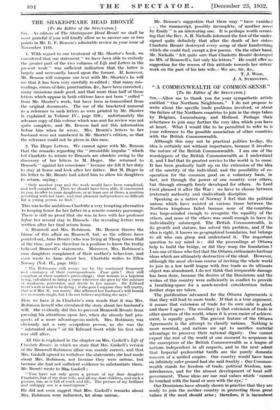THE SHAKESPEARE HEAD BRONTE
[To the Editor of the SPECTATOR.]
Sin,—As editors of The Shakespeare Head Brontë we shall be most grateful if you will kindly allow us to answer one or two points in Mr. E. F. Benson's admirable review in your issue of November 11th.
1. With regard to our treatment of Mr. Shorter's book, we considered that our statement "we have been able to embody the greater part of the two volumes of Life and Letters in the present work" was sufficient indication that the latter is largely and necessarily based upon the former. It however, Mr. Benson will compare our text with Mr. Shorter's he will sec that it has been very carefully re-edited ; that many mis- readings, errors of date, punctuation, &c., have been corrected ; many omissions made good, and that more than half of those letters which appear in both editions have not been " culled " from Mr. Shorter's work, but have been re-transcribed from the original documents. The use of the bracketed numeral as a reference to such letters as were printed by Mr. Shorter is explained in Volume IV., page 316; unfortunately the advance copy ofthis volume which was sent for review was not quite complete, and . Mr. Benson had not this information before him when he wrote. Mrs. BrontO's letters to her
husband were not numbered in Mr. Shorter's- edition, so that the reference could not be given in this case.
• 2. The Heger Letters. We cannot agree with Mr. Benson that the remarks regarding the "irresistible impulse" which led Charlotte to return to Brussels are obsolete owing to the 'discovery of her letters to M. Heger. She returned to Brussels." against her conscience" because she felt it her duty
to stay at home and look after her father. But M. Heger in his letter to Mr. Brontë had asked him to allow his daughters to return, saying :
"Only another year and the work would have been completed, and well completed. Then we should have been able, if convenient :to you, to offer to your daughters, or at least one of them, a position according with her taste, and that pleasant independence so difficult for a young person to find."
This was to the ambitious Charlotte a very tempting alternative to keeping house for her father. in a remote country parsonage. There is still no proof that she was in love with her professor 'before her second stay in Brussels—the revealing letters were 'written after her final return home.
3. Branwell and Mrs. Robinson. Mr. Benson throws the blame of this affair on Branwell, but, as the editors have pointed out, Anne Brontë (who was living at Thorp Green Hall at the time, and was therefore in a position to know the truth) believed Branwell's statements. Moreover, Mrs. Robinson's own daughters complained of their mother's behaviour, and even wrote to Anne about her. Charlotte writes to Ellen Nussey (Vol. IL, page t85):
"The Robinsons still amaze mo by the continued frequency and constancy of their correspondence. Poor girls ! they still complain of their mother's proceedings"; that woman is a hopeless being, calculated to bring a curse wherever she goes by the mixture of weakness, perversion and deceit in her nature. Sir Edward Scott's wife is said to be dying ; if she goes I suppose they will marry, that is if Mrs. It. can marry. She affirmed her husband's will bound her to remain single, but I do not believe anything she says."
Here we have it in Charlotte's own words that it was Mrs. Robinson herself who circulated the story about her husband's will. She evidently did this to prevent Branwell Brontii from pressing his attentions upon her, when she already had pro- spects of a more advantageous match. Mrs. Robinson was obviously . not a. very scrupulous person, as she was the 'infatuated slave" of Sir Edward Scott while his first wife was still. alive.
All this is explained in the chapter on Mrs. Gaskell's Life of C'harlotte Bratati, in which we state that Mrs. Gaskell's version
of the Branwell-Robinson" affair was mainly correct, and that Mrs. Giiskell agreed to withdraw the statements she had made
about .Mrs. Robinson, not because they were untrue, but because she had not sufficient evidence to substantiate them.
Mr. Brontë wrote to Mrs. Gaskell .
-" You have not only given a picture of my dear daughter Charlotte, but of my dear wife, and all my dear children, and such a picture, too, as is full of truth and life. The picture of my brilliant and unhappy son is a masterpiece."
He did not even suggest that Mrs. Gasket's remarks about Mrs. Robinson were indiscreet, let alone untrue.. . . Mr. Benson's suggestion that there may "have vanished . . . the manuscript, _possibly incomplete, of another novel by Emily" is an interesting one. It is perhaps worth record- ing that the Rev. A. B. Nicholls informed the first ofthe under- signed quite definitely that after the death of her sisters Charlotte Brontë destroyed every scrap of their handwriting which she could find, except a few poems. On the other hand, Mr. Nicholls "felt quite sure that Charlotte BrontO destroyed no MS. of Branwell's, but only his letters." He could offer no suggestion for the reason of this attitude towards her sisters' work on the part of his late wife.—We are, Sir, &c.,
T. J. WISE,
J. A. SymproToig.


























 Previous page
Previous page